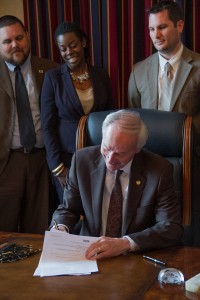 If you support religious freedom in Arkansas, you are not alone. Nearly two out of three likely voters in Arkansas support the state’s new Religious Freedom Restoration Act, and more than half believe a business-owner (such as a caterer or florist) with religious objections to same-sex marriage “should be allowed to refuse to those services to same-sex couples.”
If you support religious freedom in Arkansas, you are not alone. Nearly two out of three likely voters in Arkansas support the state’s new Religious Freedom Restoration Act, and more than half believe a business-owner (such as a caterer or florist) with religious objections to same-sex marriage “should be allowed to refuse to those services to same-sex couples.”
The findings are the result of a poll commissioned by Talk Business, Hendrix College, and Impact Management Group.
The poll indicates Arkansans strongly support religious liberty; in fact, less than half of Arkansans under 30 expressed that businesses ought to be required to provide “services to same-sex couples.”
What’s striking about the survey are its findings despite its wording. According to the survey’s authors, one key survey question was taken verbatim from a CNN poll conducted last spring. The question reads,
“If a business provides wedding services, such as catering or flowers, should it be allowed to refuse those services to same-sex couples for religious reasons, or be required to provide those services as it would to all other customers?”
The phrases “refuse services to same-sex couples” and “as it would to all other customers” slant the question significantly, missing the point: That this is about the impact of same-sex marriage on religious liberty.
Here is what we mean:
We have seen numerous cases around the country in which florists, photographers, wedding chapel owners, and others were taken to court for declining to participate in same-sex ceremonies and receptions. In each case the catalyst was not that the business was asked to serve a same-sex couple; rather, each business expressed concerns over the ceremonies and events in which they were asked to participate.
Just like the print-shop owner Alliance Defending Freedom currently represents, many of these business owners are quick to point out they will sell products and services to customers regardless of the customers’ sexual-orientation; they simply do not want to be forced to produce a message or take part in an event–such as a same-sex wedding–that violates their deeply-held religious beliefs.
A florist in Washington was taken to court for declining to provide flowers for a same-sex ceremony. The same-sex couple were longtime customers of the florist’s shop; the couple and the shop owner had no issue doing business with each other until the owner was asked to provide flowers for their wedding. That was something she could not do in good conscience. She now faces the prospect of severe penalties from the State of Washington simply for declining to participate in a ceremony that violates her deeply-held religious beliefs.
With that in mind, the survey question as easily could have read, “Should the government force a business to participate in a same-sex wedding if the owner of the business has a religious objection to same-sex marriage?” or even “Should a business be allowed to refuse to serve a same-sex wedding for religious reasons?”
Despite the slanted wording of the question, Arkansans still voiced overwhelming support for religious liberty. I imagine if the question had been worded in a more neutral manner, even stronger support for religious freedom might have been revealed.
The findings also indicate much of the controversy over the Religious Freedom Restoration Act earlier this year likely was unfounded. Arkansans support the Religious Freedom Restoration Act overwhelmingly; had the initial, more clearly-written version of the bill been signed into law, Arkansans likely would have supported it just as strongly.




